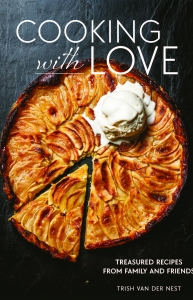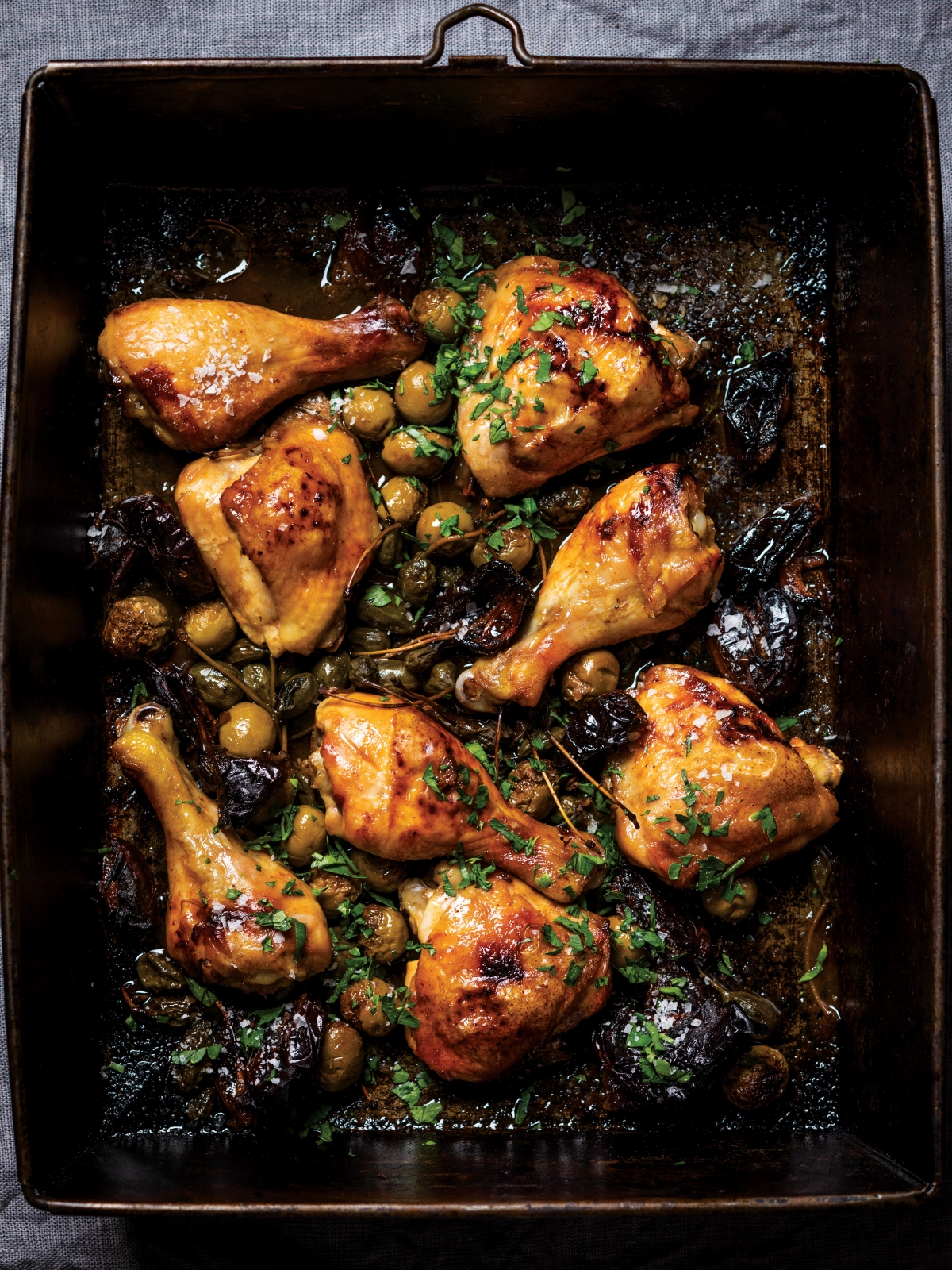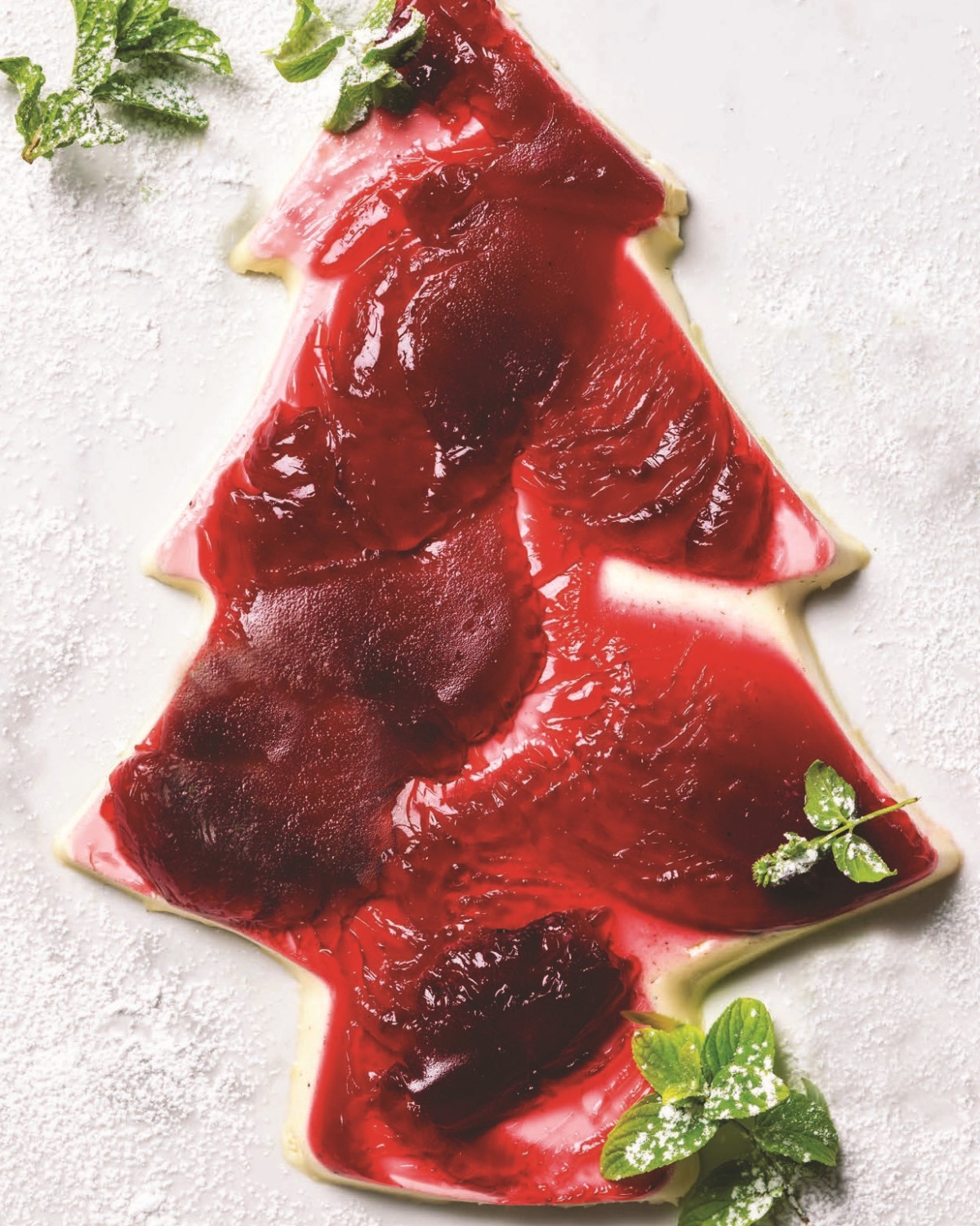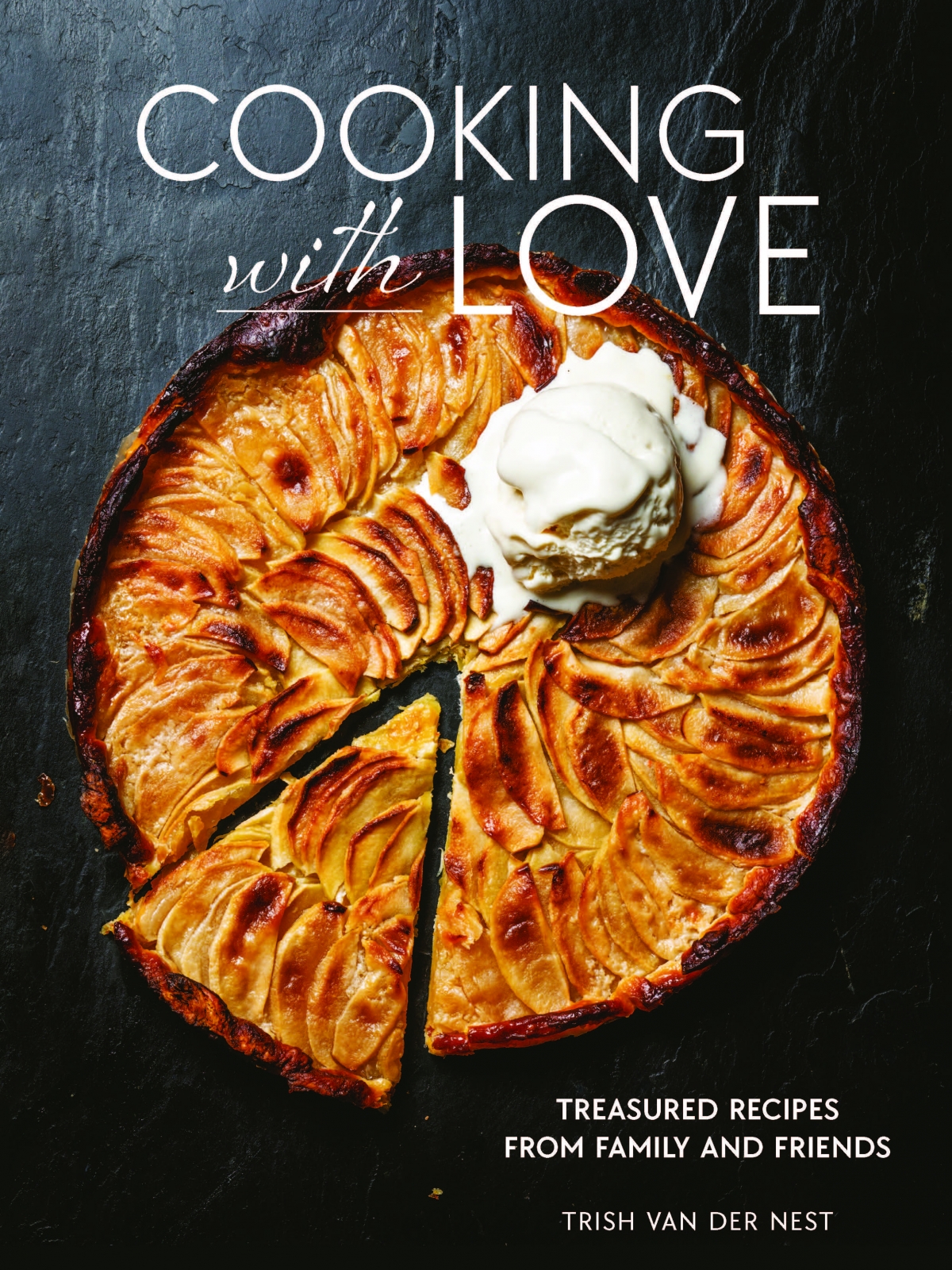
‘Cooking with love’ aptly describes Trish van der Nest’s approach to food. This passionate foodie loves nothing more than to see family and friends gathered around her table, eating a meal she has prepared.
INDEX
Roasted Tomato & Yoghurt Salad
Pasta with Marinated Tomatoes & Brie
Chicken with Olives, Dates & Caper Berries
Pan-Fried Peppercorn Fillet Steaks
Roasted Tomato & Yoghurt Salad
“My friend, Leigh Eastwood, is a marvel at making up recipes. Her version of a Greek salad entails roasting the tomatoes, olives and feta, and serving it at room temperature. It’s very delicious! This version is not unlike Leigh’s hot Greek salad, but with a slight twist.”
 Serves: 4
Serves: 4
400 g rosa tomatoes
2–4 whole garlic cloves, peeled
1–2 tsp chilli flakes
2 Tbsp dried origanum
¼ cup (60 ml) olive oil
500 g double cream yoghurt or labneh (see Notes)
Finely grated zest of 2 limes
Salt flakes or coarse sea salt
Fresh origanum or basil, for garnish
Place the tomatoes, garlic, chilli flakes and dried origanum in a roasting dish. Add a splash of olive oil and roast in a preheated oven at 180°C for 20–30 minutes. Set aside to cool slightly.
Spread the yoghurt or labneh over the base of a shallow serving dish.
Scatter over the lime zest and the salt.
Spoon over the warm tomatoes, together with any liquid from the roasting dish.
Garnish with fresh herbs and serve immediately.
NOTES
To add colour, use multi-coloured rosa tomatoes, or half each of red and yellow cherry tomatoes.
Instead of yoghurt, use 500 g bought or homemade labneh.
Pasta with Marinated Tomatoes & Brie
“Di Utton, who was a member of my book club many years ago, is a wonderful cook. She says her whole family grew up with this simple pasta dish. She lives in Cape Town now, but we still see them when we holiday in Kommetjie.”
 Serves: 4
Serves: 4
6 roma (plum) tomatoes
1 wedge Brie cheese
2 Tbsp olive oil
2 Tbsp balsamic vinegar
2 cups finely chopped fresh basil
500 g linguine, penne or fusilli pasta
Salt and black pepper to taste
Chop the tomatoes into bite-size pieces and place in a bowl.
Chop or tear the Brie into bite-sized pieces and add to the bowl, together with the olive oil, balsamic vinegar and half the basil. Set aside to marinate for at least 4 hours, or up to 8 hours.
When ready to serve, cook the pasta according to the package instructions. Drain, and immediately add to the marinated tomatoes and Brie. Toss gently to combine; the heat of the pasta will start
to melt the cheese. Scatter over the remaining basil and serve warm.
NOTES
- Instead of roma tomatoes, use 200 g cherry tomatoes, halved.
- For a lower-carb option, replace the pasta with 500 g baby marrow noodles.
Chicken with Olives, Dates & Caper Berries
“My friend, Jilly Lester, calls this dish ‘wedding chicken’ because it is perfect for feeding a crowd. It is one of those recipes that never fails to please, yet each time you eat it, it tastes slightly different. The inspiration comes from Yottam Ottolenghi’s cookbook Simple.”
 Serves: 4–6
Serves: 4–6
8–12 chicken pieces, bone-in and skin-on
200 g pitted green olives, drained
200 g whole pitted dates or pitted prunes
200 g jar caper berries in vinegar
1 cup (250 ml) white wine
Fresh parsley and/or origanum, for serving
Place the chicken in a roasting dish with the olives, dates or prunes and caper berries. Pour over the wine and the liquid from the caper berries and set aside to marinate for 2–3 hours.
Roast in a preheated oven at 180°C for 60–90 minutes, turning the chicken two or three times, until the skin is browned and the meat is tender. Garnish with chopped parsely or origanum before serving.
NOTES
I like to use chicken thighs and drumsticks, but choose whatever portions work best for you.
Use caper berries, not capers. Caper berries have a subtle, pickle-like sour flavour, which counteracts the sweetness of the dates or prunes.
Pan-Fried Peppercorn Fillet Steaks
with lentil and feta mash
“This has always been a winner in our home. Prepare the mash first, so it is ready and waiting before you start to cook the steaks.”
 Serves: 6
Serves: 6
PEPPERCORN MARINADE
4 Tbsp whole black peppercorns, lightly crushed
2 Tbsp olive oil
2–3 Tbsp lemon juice
2 tsp salt
BEEF FILLET
1–1.5 kg beef fillet, cut into 6 steaks (each ± 3–4 cm thick)
Butter, for frying
250 g fresh shallots, thinly sliced
250 ml pouring cream
2 Tbsp dry sherry or marsala, see Note
LENTIL AND FETA MASH
5 large potatoes, peeled and quartered
3–4 Tbsp butter
½ cup (125 ml) milk, warmed
400 g can lentils, drained
125 g feta, crumbled
Salt and black pepper to taste
PEPPERCORN MARINADE
Combine the marinade ingredients in a non-reactive dish. Add the steaks and turn to coat, pressing down lightly so the peppercorns stick to the meat. Set aside to marinate for 30 minutes.
beef fillet
When ready to cook, heat some butter in a large pan on medium and fry the shallots until golden.
Remove the steaks from the marinade. Place in the pan and brown on all sides. Cook for a total of 4 minutes per side for medium-rare, turning once.
Turn off the heat and add the cream and sherry or marsala to the pan. Stir through and leave to rest for 1–2 minutes, until the sauce thickens.
LENTIL AND FETA MASH
Boil the potatoes in salted water until tender, then drain and return to the pot.
Add the butter and warm milk and mash the potatoes until smooth.
Stir through the lentils and feta, and season to taste (feta is salty, so taste before adding salt). Keep warm while you prepare the steaks.
NOTES
Marsala, a fortified wine from Sicily, can be either dry or sweet. If you don’t consume alcohol, just omit it.
This recipe been adapted from 101 Greatest Recipes: Delicious Dishes from Our Food Editors by Abigail Donnelly, Hannah Lewry and Phillipa Cheifitz, published for Woolworths Taste magazine in 2009.
Christmas Panna Cotta
“I love the idea that this dessert can be made in a mould and so it is an easy one to add some festive cheer to the Christmas table. I always make it in my Christmas tree mould and the colours also just scream Christmas – the silk white of the Panna cotta married with the festive red of the berry glaze. It always looks amazing on the dessert table and it tastes delicious!”
 Makes: 1 large mould or 6–8 individual servings
Makes: 1 large mould or 6–8 individual servings
REDCURRANT JELLY
200 g redcurrants, thawed if frozen
100 ml water
30 g castor sugar
1½ gelatine leaves
PANNA COTTA
2 cups (500 ml) pouring cream
1½ cups (375 ml) full cream milk
100 g castor sugar
1 vanilla pod, split
5 gelatine leaves
Fresh mint leaves, for serving
Fresh berries, optional, for serving
FOR THE JELLY
Combine the fruit, water and castor sugar in a heatproof bowl. Cover with foil or a lid, place over a pot of water on medium heat, and simmer for 30 minutes until it becomes thin and syrupy.
Strain the fruit through a sieve into a jug or bowl and then measure 150 ml of the hot syrupy juice into a clean bowl.
In a separate bowl, soak the gelatine leaves in cold water for 5 minutes, then add them to the hot syrup and stir until dissolved. Spray a mould with non-stick cooking spray, then pour in the jelly to just cover the base ± 5.mm thick). Place in the fridge to set.
FOR THE PANNA COTTA
Combine the cream, milk, castor sugar and vanilla pod in a pot and heat until almost boiling, then remove from the heat, transfer to a bowl and set aside. Remove the vanilla pod and discard.
In a separate bowl, soak the gelatine leaves in cold water for 5 minutes, then add to the hot cream mixture and stir until dissolved.
Place in the fridge to cool. After about 30 minutes, when the cream is starting to thicken, carefully pour it into the mould. Return to the fridge until completely set.
To serve, put a plate over the mould, then invert it and shake gently, so the panna cotta slips out cleanly. Garnish with mint leaves and/or fresh berries.
NOTES
- If you can’t get frozen redcurrants, use any other red berries, or mixed berries.
- Instead of castor sugar, you can use xylitol castor sugar.
- You can make this up to a day ahead and turn it out just before serving.
- Silicone moulds have made it easier to turn out desserts, but if you are using a metal baking pan, you may need to dip the base in warm water for a few seconds before unmoulding the panna cotta.
Extracted from Cooking with Love by Trish van der Nest, out now.
YOU MAY ALSO ENJOY
Right this way for cosy eating with three mouth-watering recipes from Dinner at Matloha’s









